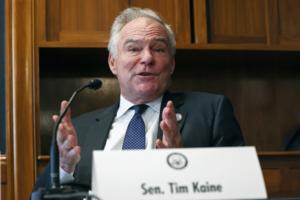Politics
/ArcaMax

Editorial: The risk of nuclear war waned after the Cold War. It's back with a vengeance
When the first nuclear bomb test took place 80 years ago, the scientists who gathered to observe the explosion in the New Mexico desert recognized they were playing with fire.
Physicist Enrico Fermi tried to break the tension by taking bets on whether the bomb would ignite the atmosphere and destroy the world. J. Robert Oppenheimer wagered $10 ...Read more

Commentary: How could ranked-choice voting reshape California politics?
Last month, New York City’s mayoral race drew national attention when Democratic Socialist Zohran Mamdani secured a stunning victory over former governor and political veteran Andrew Cuomo in the Democratic primary, thanks to the relatively new system of ranked-choice voting. Less noticed were the 28 contested New York City Council races on ...Read more

Robin Epley: California dreamin' -- of independence: Could the Golden State ever secede?
SACRAMENTO, Calif. — If you, like me, in recent days have wistfully considered a utopian fantasy where an economically powerful country of California breaks away from the chaos of a second Donald Trump presidency, then I have both good news and bad news for you:
The good news is that the fantasy seems to be rapidly gaining support. A new ...Read more

Commentary: What remains of 'public' education?
Recently, the Supreme Court handed down a decision that will likely reverberate through American classrooms for years to come. In a 5-4 ruling, the justices granted parents broad authority to exempt their children from curricular materials and school activities that conflict with their religious convictions.
Like so many recent decisions from ...Read more

Editorial: Paging Gen Z: It's not a 'micro-retirement.' It's a vacation
It’s July, and many Midwesterners are flocking to the lake, driving south to go to the beach, or simply sticking around to enjoy the fleeting hot weather at their local pool.
Even Pope Leo XIV, arguably one of the busiest and most important people in the world, is taking a summer vacation. (True, his break includes six weeks off, something ...Read more

Commentary: When democracy's symbols get hijacked -- How the far right co-opted classical imagery
For generations, Americans have surrounded themselves with the symbols of ancient Greece and Rome: marble columns, laurel wreaths, Roman eagles, and the fasces. These icons, carved into our government buildings and featured on our currency, were intended to embody democracy, civic virtue, and republican ideals.
But in recent years, far-right ...Read more

Commentary: When Darrow took on Bryan 100 years ago, science got the win. Or did it?
Before O.J. Simpson’s “trial of the century,” another courtroom clash riveted America and merited that title. In the sleepy town of Dayton, Tenn., on July 10, 1925, the Scopes “Monkey Trial” was gaveled to order. The issues contested in the second-story courtroom of the Rhea County courthouse may seem long settled, but they still ...Read more

Commentary: Make housing more secure, not less -- Domestic violence survivors need safety
She called me while she walked her dog because it was the only time she could use the phone without being monitored by her husband. Reaching out to me as a program manager for domestic survivors in a major U.S. city, she wanted to see what her options were and where she and her seven-year-old son could go.
I went over the resources in the ...Read more

Commentary: Conspiratorial thinking isn't growing – Its consequences are
The Comet Ping Pong Pizzagate shooting, the plot to kidnap Governor Gretchen Whitmer, and a man’s livestreamed beheading of his father last year were all fueled by conspiracy theories. But while the headlines suggest that conspiratorial thinking is on the rise, this is not the case.
Research points to no increase in conspiratorial thinking. ...Read more

Editorial: Can Elon Musk tap into voters' discontent?
Elon Musk’s “America Party,” launched on July 5, sent shockwaves through Washington. It’s not likely to sweep the 2026 midterms, but it’s a loud signal that Silicon Valley and younger Americans are fed up with Democrats and Republicans dodging the national debt crisis. Politicians on both sides of the aisle would be wise to take ...Read more

Commentary: America's diaper bank model is incapable of meeting families' needs
Right now, it feels like America is being held together with duct tape. We’re living through a steady drumbeat of instability. And in all that chaos, one quiet crisis continues to unfold, largely ignored but deeply damaging.
America has a diaper problem.
Nearly half of all families with young children can’t afford enough diapers to keep ...Read more

Tom Philp: What if the only thing California Democrats can make more affordable is weed?
SACRAMENTO, Calif. -- The affordability agenda promised by Sacramento Democrats hasn’t had measurable impacts on the intractable problems of electricity, gasoline, property insurance, or housing, which are all too expensive. So lawmakers are now focusing on something they can achieve.
A bipartisan juggernaut is emerging to hold the line on ...Read more

Jackie Calmes: Thoughts and prayers? Sure, but hold the Trump administration accountable
"I'm going to give you everything you want," President Donald Trump told disaster-stricken residents and local officials. "I'm going to give you more than any president would have ever given you."
That was in January, in Los Angeles, in the wake of the catastrophic Palisades and Eaton fires. If Trump could express such magnanimity in California...Read more

Editorial: Able-bodied Medicaid recipients must work? Oh, my!
Democrats are sure they’ve found a winning formula in instigating voter anger over Republican “cuts” to Medicaid. The progressive talking points are already set for the midterms: Thanks to the GOP and President Donald Trump, vulnerable men, women and children will lose their health care coverage and be thrown out of hospitals and onto the ...Read more

Commentary: Why a college degree no longer guarantees a good job
A college education used to be considered, along with homeownership, one of the key pillars of the American Dream. Is that still the case? Recent experiences of college graduates seeking employment raise questions about whether a university diploma remains the best pathway to pursuing happiness, as it once was.
Consider the case of recent grad ...Read more

Mary Ellen Klas: The GOP's Medicaid cuts have a very convenient timeline
When President Donald Trump signed his tax bill into law, he acknowledged it included deep spending cuts but suggested people “won’t even notice it.”
“The people are happy, they’re happy,” he added.
Judging from the reaction of Republican lawmakers, including those the swing states that will decide the partisan makeup of the House...Read more

Allison Schrager: Social Security needs more than risky wagers
I have been a pension nerd since I was 20 years old. So I have been hearing for literally decades that there is a simple, magical solution to all our retirement funding problems: Just take more risk! When the investments pay off, the coffers will be replenished and all will be well.
Now two U.S. senators, Republican Bill Cassidy of Louisiana ...Read more

Commentary: Trump's foreign-aid cuts are ending lives -- and US influence
The White House has hailed H.R. 1, aka the One Big Beautiful Bill Act, as a “once-in-a-generation piece of legislation” that puts “America First.” Most of the public debate focused on its extension of lower taxes for the rich, the ballooning federal debt, and massive cuts in Medicaid spending. Yet equally important is what the act will ...Read more

Mark Z. Barabak: He tried to keep Trump from a second term. But six months in, 'I'm very impressed.'
DENVER — Roger Hutson was never a huge fan of Donald Trump.
In 2016, he supported Marco Rubio for president, helping raise hundreds of thousands of dollars for his Republican primary bid.
In 2024, Hutson worked with "No Labels," a group of Democrats, Republicans and independents, to forge a bipartisan ticket with the express purpose of ...Read more

Allison Schrager: Megabills didn't break the economy before and won't now
Opinions of the One Big Beautiful Bill tend toward the extreme. One of its main authors calls it “the greatest piece of Republican legislation in a generation,” while one of its most authoritative critics says it makes him ashamed to be an American. So allow me to offer what counts as a radical view: The bill is neither as terrible as its ...Read more























































